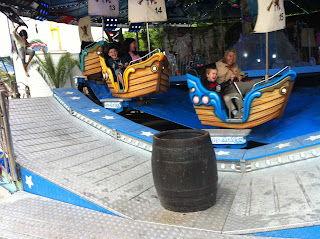It's so wet here that our lawn is mostly moss on the shadier side of the building.
The landscape plants are some of the same ones commonly planted in Seattle, like this mock orange.
There are conifers everywhere, and many of them are native to the Pacific Northwest.
Our apartment is very comfortable, with plenty of space for four people. It does have some quirks, though. For instance, the sinks and tubs have separate hot and cold taps. There is no such thing as warm water. You choose hot or cold. I don't know if this is typical here or if it's just an oddity of our apartment.
Another quirk is our combination washer/dryer, which lives under the counter in the kitchen. It's tiny, so you can't put a whole lot of clothes in there at once. And the drying function is extremely subpar. I usually take out about half of the items in the load and hang them on a clothes rack to dry before turning the dryer on for the rest of the items. It usually takes three runs through the dryer to get the clothes dry, even with only half a load in there. The clothes on the rack often dry before those in the dryer if we have a nice day and open the windows. I constantly have laundry in progress, and we have stacks of clothes in need of washing. We get behind whenever we leave town, and there's not much chance of catching up, unless we fill our living room with clothes racks. When I get desperate, I hang wet clothes from every door knob, tub, towel rack, and even the bars in the closets.
Here is my nemesis, the combo washer/dryer.
I have also relearned the art of coffee making this summer. The typical system for making coffee here is to turn on your electric kettle to boil the water (used for tea as well). Then, you put the water and coffee in the French press. I am used to the straightforward drip coffee maker, where the number of scoops of coffee added equals the number of cups of coffee you want, with a little more added for stronger coffee. With the French press, the amount of coffee varies depending on the type of coffee you are using (size of grounds, darkness of roast) and how long you plan to let it steep before pouring. There is no heating plate, like a drip coffee maker has, so you need to drink the coffee right away so it doesn't get cold. I am still working on perfecting the timing, though that might be a futile pursuit given that the kids' needs and desires don't wait for my coffee. One benefit of this coffee making system is that I tend to drink less coffee than I do at home.
My coffee-making system
Here's another thing that I'm still not used to. The streets are very narrow in most of the downtown areas of the neighboring towns. Instead of forbidding parking on the streets, or making these narrow streets one-way, they allow cars to park in one lane of traffic, leaving only one lane open for two-way traffic on the street. This requires an elaborate system of turn-taking, with traffic stopping frequently to let cars going the other direction pass. Sometimes people take advantage of this situation, and 12 cars will barrel through in one direction before letting you pass, usually during what is called "the school rush," when parents are taking their kids to school. I haven't seen a school bus to date, so I'm guessing they are uncommon or non-existent. Most of the time, the system works, but I never cease to find it utterly nerve-wracking and stress-inducing. I do my best to avoid these routes, even if it means going the long way around or going through a town with frequent train crossings. Another by-product of the narrow streets is that people tend to park half in the street and half on the sidewalk to make more room for cars on the street. This makes very narrow sidewalks even narrower.
Typical parking style in Sunninghill and other small towns
One really lovely difference between England and America is that conserving fuel seems to be a natural part of life and not a politically-charged topic of conversation as it is at home. Hybrid and/or teeny-tiny cars are the norm here, and almost no one drives anything larger than a station wagon. Our station wagon feels monstrous when we try to park it in the narrow parking spaces in most lots (a.k.a. car parks). The British tendency toward restraint seems to be of great benefit to their care of the environment. How do we get Americans to care in a culture of more-is-better?
"Another red bus going green for London"
Even the London Eye had a sign about its fuel-efficiency and usage of green power.
Maybe this is why the Brits tend more toward fuel efficiency: it costs us about 84 pounds to fill up our car. That's about $130 for about 15 gallons ($8.67/gal).





















































